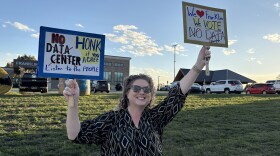Despite the recent reopening of the federal government, refugees who have resettled in the U.S. no longer qualify for SNAP benefits.
Unrelated to the temporary disruption in SNAP benefits during the federal government shutdown, President Donald Trump's One Big Beautiful Bill signed into law on July 4 revoked a previous policy of allowing refugees food assistance under SNAP.
The new eligibility rules are expected to impact about 7,000 refugees on SNAP in Kentucky and 90,000 across the country, according to the Congressional Budget Office.
The law impacts those already receiving benefits as well as new applicants.
Only U.S. citizens, Green Card holders who have gone through a five-year waiting period, and some Haitian and Cuban nationals with special status are eligible for SNAP.
The USDA gave states 120 days to implement the changes, making Nov. 1 the enforcement deadline. Since then, many refugees in southern Kentucky have been using the food pantry at the International Center of Kentucky based in Bowling Green.
"Many of the refugees feel comfortable coming to the center because they consider this their home. We understand them, we know them, and know the kind of food they eat," explained Executive Director Albert Mbanfu. "They're not really comfortable going to other food banks to encounter people they don't know, people they're not sure if they'll be treated well and all of that."
Before the loss of SNAP benefits, Mbanfu said the International Center's food pantry supported about 80 refugees a week. Recently, it served 100 refugees in a single day.
Earlier this month, the International Center's pantry was nearly bare with a small amount of rice, beans, olive oil, and pasta sauce. There were even fewer culturally appropriate foods. The pantry relies almost solely on community donations.
Most refugees have fled war and persecution to arrive in a new country with no local connections of established community ties.
"They need some money to buy food. These are individuals who are authorized to come in by the federal government," Mbanfu said. "Right now, we have food but we will run out of it very soon, and that's my fear."
Food assistance isn't the only way President Trump's administration has pulled back the nation's decades-long support for refugee communities.
The budget law also revokes refugees' access to Medicaid starting in October 2026.
Refugee admissions into the US are being slashed under Trump
Pushing refugees off of social safety nets represents the Trump administration's shift in policy toward the group.
The latest number of refugees being allowed to resettle in the U.S. is the lowest since 1980.
President Trump announced last month that only 7,500 refugees would be admitted into the U.S. in the federal fiscal year that began Oct.1, a 94% cut from the 125,000 cap set by President Joe Biden.
Most of the refugees being allowed in are white South Africans, known as Afrikaners, who Trump claims are facing violence and discrimination. Albert Mbanfu, who heads the International Center of Kentucky, disagrees.
"To the best of my knowledge, there is no evidence they're being targeted. No violence, no persecution," Mbanfu told WKU Public Radio." High crime in South Africa in general and it's targeted at everybody, not just the Afrikaners."
Mbanfu says many natives of Afghanistan, on the other hand, have been trying to flee the Taliban since the U.S. withdrawal in 2021. He adds that many resettlement agencies are struggling to welcome new arrivals who they feel aren't truly refugees.
Bowling Green was only assigned 100 refugees this year, which Mbanfu says are all white South Africans.
"There are so many of them from around the world who really qualify, whose lives are in danger, but that's not what our government has decided to do," Mbanfu said.
Copyright 2025 WKU Public Radio






